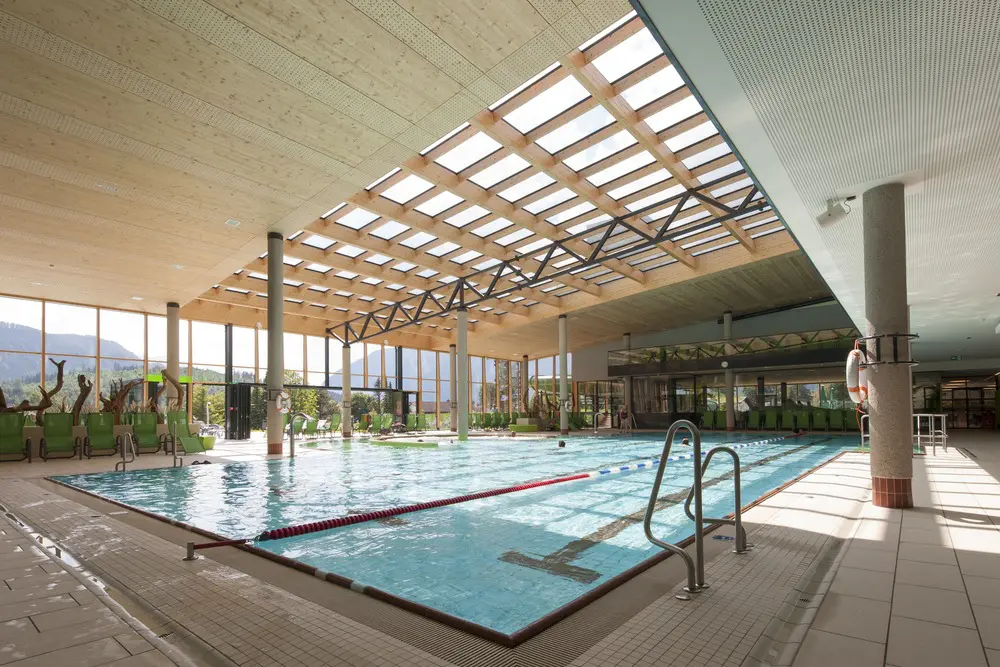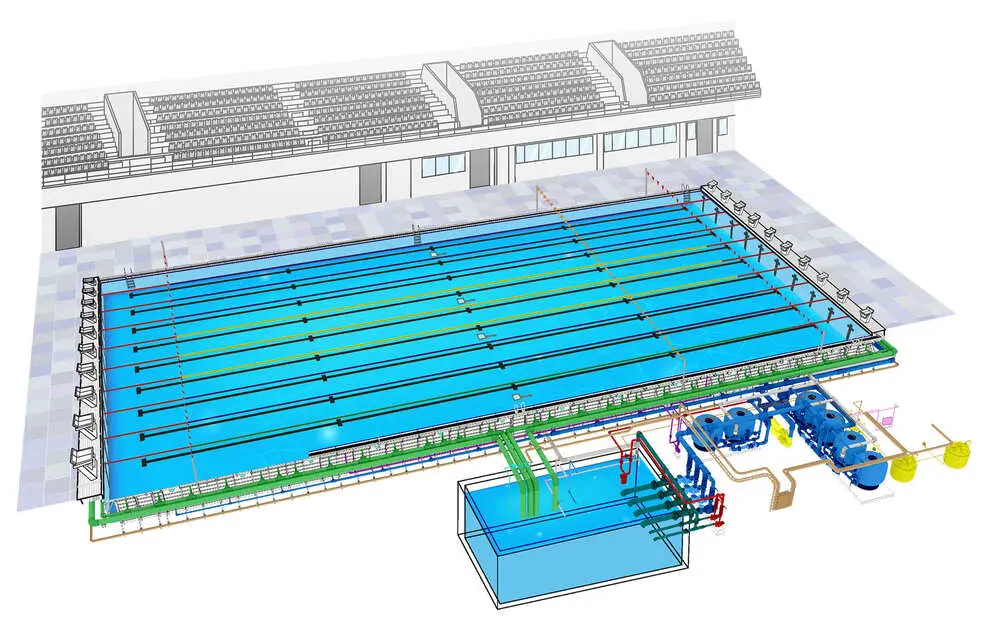The digital age has ushered in a wave of technological advancements, transforming industries and redefining possibilities. At the forefront of this revolution is digital twin technology – a virtual replica of physical systems that mirrors real-time performance, enabling unprecedented insights and control.
The swimming pool industry is diving headfirst into this innovation, harnessing the power of digital twins to achieve smarter management, unparalleled sustainability, and significant cost savings. By creating a digital twin of a swimming pool and the whole commercial facility, operators and engineers can gain a deeper understanding of its inner workings and operate through predictive maintenance.
This virtual model simulates how the various components interact, identifying inefficiencies and optimizing performance. This allows for the optimization of energy consumption, water usage, and chemical balance. Maintenance needs can be predicted and addressed proactively, extending the lifespan of equipment and reducing downtime.
Ultimately, digital twin technology is transforming swimming pools and aquatic facilities into smarter, more efficient, and more sustainable installations. Here, we’ll now explore its specific applications and benefits in swimming pool management.
Dive deeper with the eBook
What do we mean by digital twin technology?
A digital twin is a virtual representation of a physical object or system, meticulously crafted to mirror its real-world counterpart in intricate detail. This digital doppelganger is not a static replica but a dynamic, living entity that continuously receives and processes real-time data from a network of sensors embedded in the physical system. This dynamic synchronization allows for accurate monitoring, analysis, and simulation, providing valuable insights into operational efficiency.
In swimming pool facilities, digital twins can replicate the entire facility environment, including water quality, temperature, filtration systems, energy usage. Sensors act as the digital twin’s eyes and ears, collecting information on everything from water temperature and chemical levels to pump performance and energy consumption.
Digital twin technology’s adaptability goes well beyond simple pool management. It allows operators to perceive the pool as a vital component within a broader facility environment. It is a tool that also integrates other areas and external factors into its equation, such as changing rooms, lighting, humidity, weather, users, etc.
Smart pools use the latest technology to automate and control many of the processes and measurements that ensure optimal pool and facility functioning. Digital twin technology is one of the latest smart systems that can be applied to swimming pool facilities and its management.

Applications and benefits of digital twin technology
Maintaining a pristine and inviting swimming pool is essential, whether it’s a hotel, wellness center, or sports club. Imagine a pool manager, juggling a multitude of tasks: ensuring crystal-clear water, managing energy bills, and keeping equipment running smoothly. It’s a balancing act that demands constant vigilance and a knack for troubleshooting.
The recent integration of digital twin technology into smart pool systems has elevated this innovation to a new level. It observes resource usage patterns, identifying opportunities for optimization and cost reduction. It closely monitors equipment, anticipating potential problems before they cause disruptions. This real-time data transforms the pool manager from a reactive troubleshooter into a proactive facility director.
Forward-thinking establishments are already reaping the benefits of this technology, experiencing improved efficiency, reduced costs, and enhanced sustainability. Let’s break down the benefits.
1. Streamlined smart management
Digital twins enable pool managers to orchestrate every facet of pool operation from a centralized digital command center. Real-time data on water chemistry, temperature fluctuations, and filtration performance translates into proactive adjustments and precise chemical dosing. This eliminates guesswork, prevents costly errors, and elevates the user experience with consistently pristine water.
2. A sustainable pool
Digital twins facilitate greater sustainability in pool management. By pinpointing inefficiencies and recommending eco-friendly alternatives, they enable significant reductions in chemical usage, energy consumption, and water waste. A greener pool not only benefits the planet but also helps pool owners stay ahead of evolving environmental regulations.
3. Energy savings that make a splash
Energy costs are a significant burden for pool owners. Digital twins thoroughly analyze energy consumption and monitor usage patterns for heating, lighting, and filtration systems. The result? Precise adjustments that maximize efficiency, leading to substantial savings and a reduced carbon footprint.
4. Water efficiency, drop by drop
Water is a precious resource, and a digital twin is a vigilant guardian. By monitoring levels, detecting leaks, and forecasting evaporation rates, they enable pool operators to implement targeted water-saving strategies. This translates into reduced water bills and a commitment to responsible resource management.
5. Poolside control, anytime, anywhere
The convenience of remote monitoring allows pool managers to keep a watchful eye on pool conditions from any location. Real-time alerts on mobile devices ensure swift action in case of unexpected issues, from chemical imbalances to equipment malfunctions. This eliminates the need for constant on-site supervision while guaranteeing a safe and enjoyable pool environment.
6. Maintenance that predicts the future
By continuously analyzing data from sensors and pool equipment, digital twin technology can detect subtle anomalies and predict potential failures before they cause disruption. This proactive approach minimizes downtime, extends equipment lifespans, and reduces costly emergency repairs.
7. A ripple effect of cost savings
Optimized energy consumption, reduced water usage, and predictive maintenance converge to create a wave of cost savings. Lower utility bills, reduced chemical expenses, and minimized repair costs contribute to a healthier bottom line for pool owners and operators.

Other advantages and requirements
The versatility of digital twin technology extends far beyond mere pool control. It enables operators to view the pool as an integral part of a larger commercial ecosystem. By providing a holistic perspective, this technology unlocks a new level of operational efficiency.
A digital pool twin doesn’t just compare ideal and actual pool data. It acts as an intelligent advisor, recommending tailored management solutions to minimize consumption and achieve optimal water treatment. It even serves as a virtual simulator, predicting the outcomes of equipment changes or temperature adjustments. This predictive capability is invaluable for proactive maintenance.
To unlock the full potential of digital twin technology, it needs to be integrated into pools connected to smart systems with control and diagnostic sensors, such as Fluidra Connect. This seamless connection allows for real-time data exchange, creating a dynamic and responsive pool environment.
But the benefits don’t stop at the pool’s edge. Digital twins can integrate with meteorological data, understanding how weather patterns impact the pool and adjusting parameters accordingly. They can even monitor user activity and facility-wide consumption, providing insights into water usage in changing rooms, lighting efficiency, heating systems, and overall humidity control. As a result, the digital twin becomes a central hub for comprehensive facility management through integration with a Building Management System (BMS).

Dive into the future
Digital twin technology is not just a trend; it’s an upcoming paradigm shift in how we manage and experience swimming pools. By bridging the physical and digital worlds, this innovation empowers pool operators and owners with unprecedented insights and control. From efficient smart management and sustainability to energy efficiency, water consumption optimization, remote monitoring, and predictive maintenance, digital twins enhance every aspect of pool operations.
Beyond operational efficiency, digital twins are instrumental in driving sustainability, aligning with the growing demand for environmentally responsible practices. As the industry continues to evolve, embracing this technology is no longer a luxury but a necessity for those who seek to stay ahead of the curve.
Digital twins are poised to make a significant splash in the swimming pool industry, creating a new standard for intelligent, efficient, and sustainable pool operation. It’ll be the earlier adopters that will reap the most substantial benefits.
